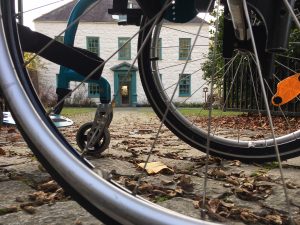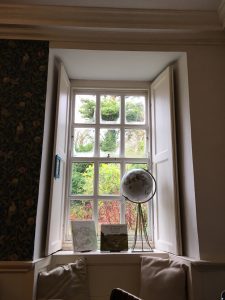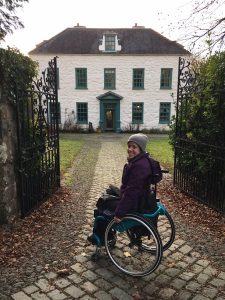Back in December 2019, Grace Quantock came on a retreat to Nant, our Writers Retreat Cottage. Here’s a blog by Grace based on her stay at Nant.
Grace Quantock is a writer and psychotherapeutic counsellor. She writes about the intersection between social justice, marginalised identities and the creative arts. Her work has been featured in The Guardian, New York Magazine, The Huffington Post and The Unexpected Shape. She is working on a book about marginalised bodies in a polarised world.
My stay at Nant in December 2019 was my first writing residency and to prepare for it I asked writer friends for advice on how to make the most of the precious time. Emails came in from New York, San Diego, London, Cardiff and Edinburgh; they were full of excitement and advised me to plan what I wanted to do during the residency and to be kind to myself in my planning. I gathered up my ideas that were scattered across 7 or 8 journals, printed out copies of essays I love and wanted to do a closer reading of and loaded up my laptop with the draft of the essay I planned to work on. A new notebook and 2 bottles of ink made me ready. My mother always used pen and ink in university; they let you write faster, she explained and sometimes that’s necessary. I use a Lamy Safari fountain pen with Waterman bottled ink, it’s less painful for me to move ink and nib over paper for a long period, biros drag too heavily.

I planned to work on my essay collection, On The Margins, an autobiographical and psychological exploration of marginalised bodies in an increasingly polarised society. Exploring unruly body/minds, otherness and embodiment, I investigate the boundaries where we connect and the power of our stories. The work draws from my personal experience, psychotherapeutic counselling work and the teachings from the scarred and sacred folx living at the margins.
Months before, when I got the email with the news of a Francis W Reckitt Trust grant (which is what allowed me to stay at Nant), I was overjoyed and overwhelmed. Joyful because this would make it possible to travel to a beautiful space and have the resources to focus on my writing. Overwhelmed, because at that time I didn’t quite know how I’d get myself, my wheelchair, crutches, luggage and a week’s worth of food to North Wales. I just knew that I would. As a writer living with multiply marginalised identities and navigating structural and prejudicial challenges in my daily life, the possibility of a time in a supported space to focus on my work was almost unimaginable. I reassured myself I was worth the time and space I was occupying; I don’t have to prove my rights to resources, I can have the opportunity to try and develop without it reflecting on my community. I reached out to my writing mentor with my fears that I wouldn’t be able to handle such an opportunity. They replied, “First drafts as the closest glimpse of [the] psyche [you] can get. It’s not meaningful, but it’s the stuff meaning is made from”. The email arrived as I was travelling to Nant on a two carriage train, watching the withdrawing sun light leaving long shadows over the fields we were travelling through.
It can be tough being disabled in an unfamiliar space. All the habitual tricks and patterns I rely on to circumnavigate difficulties fall flat. It’s a risk for me not to fall with them. I can’t grab a usefully positioned table, I need to learn where the uneven paving is, my adaptive equipment is all at home so I’m making things up and compensating as I go. Staying somewhere new is a particular kind of courage; when non-disabled people say a space is accessible, do they mean an actual disabled person can access it, or do they mean “Looks O.K to me”, which also translates as “Just a little step” or the classic, “We have a lift”, said proudly. The infrequently used lift is almost inevitably broken. In planning to stay at Nant, I was heartened by the staff’s attentiveness, generous information and Miriam working with me to see what was possible. I wasn’t treated as a disruption or a guinea pig to test adaptions, but rather as a writer at work. If you haven’t experienced these difficulties, you might wonder why I anticipated them but they are ubiquitous for many disabled people and it’s delightfully shocking to meet respect. I was joyful to find that at Nant.
I was amazed at the beauty of the space and the welcome when I arrived. I was staying in Nant, a gorgeous, newly renovated cottage. I slept next door as it was level access but in the morning I’d cross the few meters to Nant and after making breakfast, I had an opportunity to write in the beautiful light workspace of the cottage, cwtched up under a welsh wool blanket or to use one of the three libraries in Ty Newydd.

I have always been someone who focused on being able to write anywhere, simply because I’d never had a special space or time to write within. So if I didn’t write anywhere, I wouldn’t write at all. However, having this space, I was shocked at how much it impacted my ability to drop more deeply into my work. How much was writing about swimming in the sea informed by sitting in the curving window seat looking out onto the sea beyond? Much of what I experienced there made it’s way into the piece. The quiet libraries which have held so much scholarship and reflection were a wonderful setting in which to reflect and innovate. I was delighted by the extensive collections of Welsh literature and I always adore librarians; a writer’s best friend.
I’ve known friends do DIY writing retreats by booking a cheap hotel room for a week and while I am a lifelong advocate for making miracles in the tight spaces we find ourselves in; I’m now reflecting on what it is to be well-resourced. It was my stay at Nant that inducted me into the joys of writing in location and how it imbues the work in a way that I would never have anticipated. Away from Nant and shielding due to my covid-19 risk, I am more aware than ever of the impact of environment on the content and form of my writing. Just as my environment impacts me, so the space my work is produced within shapes it. I’m writing about living on the margins from a space that is increasingly risky, as council services for disabled people – already faltering from a decade of austerity – are often now entirely inaccessible. I am dipping back into my notes made at Nant more and more to resource my writing at a time when the health risks threaten bodies and creativity is submerged in grief. More than ever, I am aware of the necessity of such creative spaces and democratising access to them.
